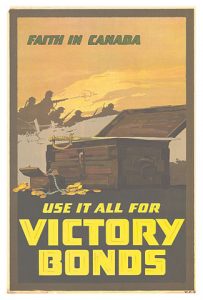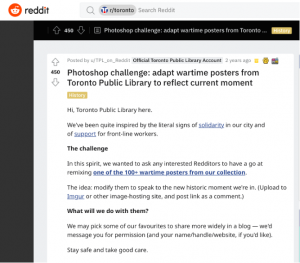
Covid REMIX: Toronto Public Library and friends remix wartime posters for the pandemic (Toronto, Canada)
In the depths of Covid lockdown, the Toronto Public Library provoked the public with a creative challenge: to pick a WWII propaganda poster from its online collection, and adapt it for Covidtimes. This simple, cheap, low-tech initiative proved a perfect vehicle for people’s pent-up desire to create, share, and contribute, especially during those unusual times. Many submissions were created and shared, boosting awareness and appreciation of the library’s collections. By welcoming the public’s creativity, humour, and imagination, the library showed itself to be responsive, relevant, and fun.
Background
 The Toronto Public Library is one of the world’s busiest urban public library systems, with 100 branches across the city, 10.5 million items, and a diverse range of programs and online services. Its mission is to “provide free and equitable access to services which meet the changing needs of Torontonians. The Library preserves and promotes universal access to a broad range of human knowledge, experience, information and ideas in a welcoming and supportive environment.”
The Toronto Public Library is one of the world’s busiest urban public library systems, with 100 branches across the city, 10.5 million items, and a diverse range of programs and online services. Its mission is to “provide free and equitable access to services which meet the changing needs of Torontonians. The Library preserves and promotes universal access to a broad range of human knowledge, experience, information and ideas in a welcoming and supportive environment.”
It also manages Digital Archive Ontario, an archive of 155,000+ historical items that have been digitized by the library’s Preservation and Digitization Department. There, David Sprague serves as Digital Content Lead, a role involving finding ways to increase online access to the library’s special collections and exhibits, as well as redesigning web pages to make them easier to use.
Description
In response to the Covid-19 situation, on March 13, 2020, all libraries were forced to close, together with all community centres, museums, and many other facilities. Four days later, the leader of the province declared a state of emergency. Libraries remained closed for over two months, and during the middle of this shutdown period, the library’s Digital Content Lead observed that citizens were spontaneously creating and posting signs of solidarity and support around the city, and he recognized parallels between this and the wartime posters within the library’s online archives.
So he posted a creative challenge (pictured right) on the Toronto subreddit, a social media forum with over 400,000 people. Within five days, a total of 66 remixed posters had been posted on the forum, and the Library published a collection of 16 best submissions, alongside the original poster from their collection, crediting all creators involved.
Impact
- Boosting awareness of the library’s historical archives, and inspiring people to see its contemporary relevance.
- Positioning the library as empathic about current affairs, engaged in communities beyond the library, and open-minded about collaboration and experimentation with others.
- Challenging, entertaining, and uniting people with a fun creative challenge during a period of shutdown and isolation
- Promoting messages of public health for the benefit of society, which also implicitly reminding people that “we have been through such challenges before”
- Openly engaging with local creatives, and stimulating them to create remixed with a bold, clever, funny, and/or nostalgic quality, which increases the chance of the images going “viral”. These images were shared online by the creative who made them, in newspapers and magazine articles, and by the library. The result: boosting the visibility of the library, refreshing its image, and strengthening the sense of engagement between the library and local creatives.
Interpretation
This initiative “Meets the public where they are”, by reaching out to them through the outside channels where they are, and engaging with their concerns and needs of the moment. It challenges the creativity of their audiences. As museums develop new technological capacities, (at least some of) their audience does as well. It embraces the open experimentation possible with digital. With the original item safely stored, the institution can allow others to play, experiment, and derive new things from it. Toronto Public Library’s effort can be seen as an example of a lean, “kite-like” initiative (as opposed to a heavy “space-shuttle” project). Such an initiative is quick, cheap, simple, and playful, and will “take off” to the extent that it can harness the invisible but powerful forces beyond: people’s desire to create/share/give/laugh/belong, etc.
References
- Daubs, Katie. “Toronto Public Library and Friends remix wartime posters for the pandemic.” The Toronto Star, April 26, 2020.
- Digital Archive Ontario. Canadian WWII posters. Digital Archive Ontario.
- Heller, Stephen. “The Daily Heller: Covid Remix.” PRINT magazine, May 19, 2020.
- Sprague, David. “Photoshop Challenge: Adapt Wartime posters from Toronto Public Library to reflect current moment: Toronto.” Reddit, April 17, 2020.
- Sprague, David. “We asked Toronto to remix wartime posters for the current Covid19 moment – See the amazing results.” Toronto Public Library, April 22, 2020.
- Toronto Public Library. Vision Mission and Values: Toronto Public Library.
Author
Header photograph
Photo by Bilal Karim on Unsplash

